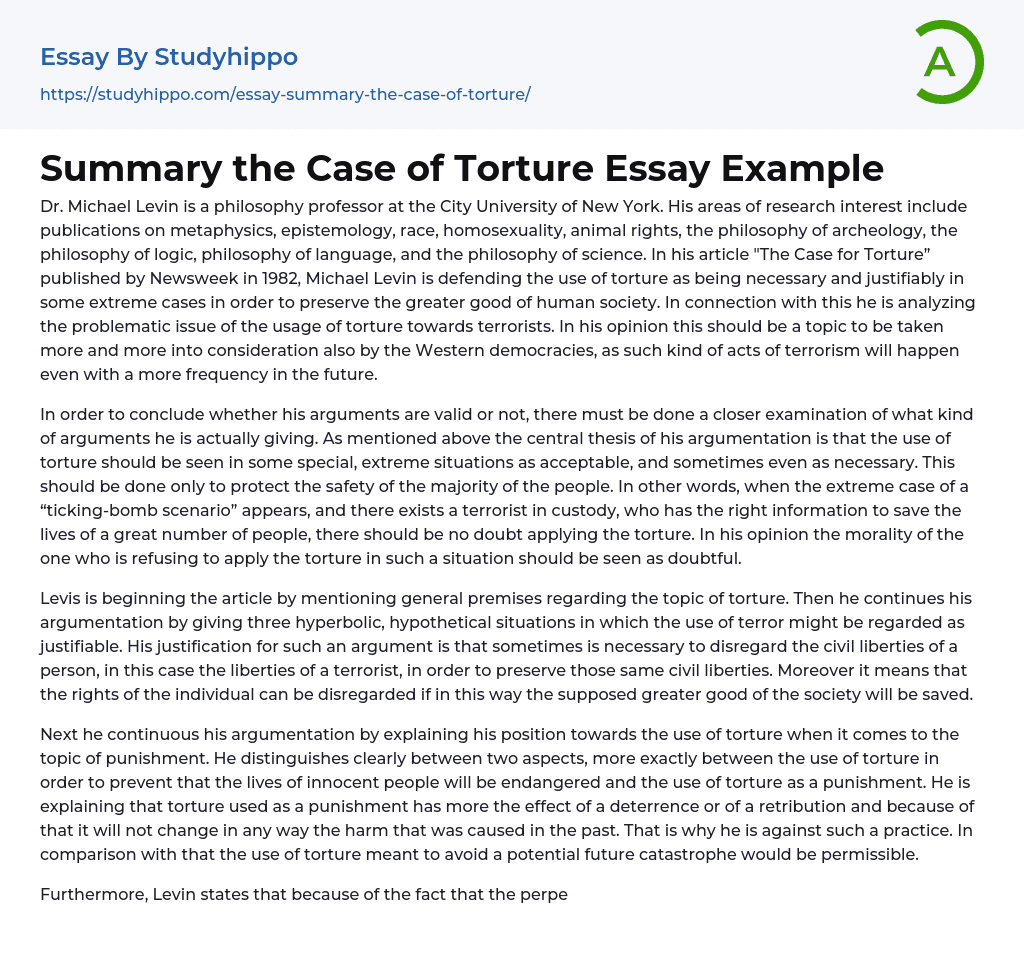Dr. Michael Levin is a philosophy professor at the City University of New York. His areas of research interest include publications on metaphysics, epistemology, race, homosexuality, animal rights, the philosophy of archeology, the philosophy of logic, philosophy of language, and the philosophy of science. In his article "The Case for Torture” published by Newsweek in 1982, Michael Levin is defending the use of torture as being necessary and justifiably in some extreme cases in order to preserve the greater good of human society. In connection with this he is analyzing the problematic issue of the usage of torture towards terrorists. In his opinion this should be a topic to be taken more and more into consideration also by the Western democracies, as such kind of acts of terrorism will happen
...even with a more frequency in the future.
In order to conclude whether his arguments are valid or not, there must be done a closer examination of what kind of arguments he is actually giving. As mentioned above the central thesis of his argumentation is that the use of torture should be seen in some special, extreme situations as acceptable, and sometimes even as necessary. This should be done only to protect the safety of the majority of the people. In other words, when the extreme case of a “ticking-bomb scenario” appears, and there exists a terrorist in custody, who has the right information to save the lives of a great number of people, there should be no doubt applying the torture. In his opinion the morality of the one who is refusing to apply the torture in such a situation shoul
be seen as doubtful.
Levis is beginning the article by mentioning general premises regarding the topic of torture. Then he continues his argumentation by giving three hyperbolic, hypothetical situations in which the use of terror might be regarded as justifiable. His justification for such an argument is that sometimes is necessary to disregard the civil liberties of a person, in this case the liberties of a terrorist, in order to preserve those same civil liberties. Moreover it means that the rights of the individual can be disregarded if in this way the supposed greater good of the society will be saved.
Next he continuous his argumentation by explaining his position towards the use of torture when it comes to the topic of punishment. He distinguishes clearly between two aspects, more exactly between the use of torture in order to prevent that the lives of innocent people will be endangered and the use of torture as a punishment. He is explaining that torture used as a punishment has more the effect of a deterrence or of a retribution and because of that it will not change in any way the harm that was caused in the past. That is why he is against such a practice. In comparison with that the use of torture meant to avoid a potential future catastrophe would be permissible.
Furthermore, Levin states that because of the fact that the perpetrator was acting consciously, he has deliberately renounced at his civil liberties, and therefore the lives of the victims that he is endangering must have priority and are to be first of all considered. The terrorist is indeed a
human and has rights, but the lives of all the people that are supposed to be hurt by his terrorist acts are more important.
- Mass Incarceration essays
- John Locke essays
- 9/11 essays
- A Good Teacher essays
- A Healthy Diet essays
- A Modest Proposal essays
- A&P essays
- Academic Achievement essays
- Achievement essays
- Achieving goals essays
- Admission essays
- Advantages And Disadvantages Of Internet essays
- Alcoholic drinks essays
- Ammonia essays
- Analytical essays
- Ancient Olympic Games essays
- APA essays
- Arabian Peninsula essays
- Argument essays
- Argumentative essays
- Art essays
- Atlantic Ocean essays
- Auto-ethnography essays
- Autobiography essays
- Ballad essays
- Batman essays
- Binge Eating essays
- Black Power Movement essays
- Blogger essays
- Body Mass Index essays
- Book I Want a Wife essays
- Boycott essays
- Breastfeeding essays
- Bulimia Nervosa essays
- Business essays
- Business Process essays
- Canterbury essays
- Carbonate essays
- Catalina de Erauso essays
- Cause and Effect essays
- Cesar Chavez essays
- Character Analysis essays
- Chemical Compound essays
- Chemical Element essays
- Chemical Substance essays
- Cherokee essays
- Cherry essays
- Childhood Obesity essays
- Chlorine essays
- Classification essays




